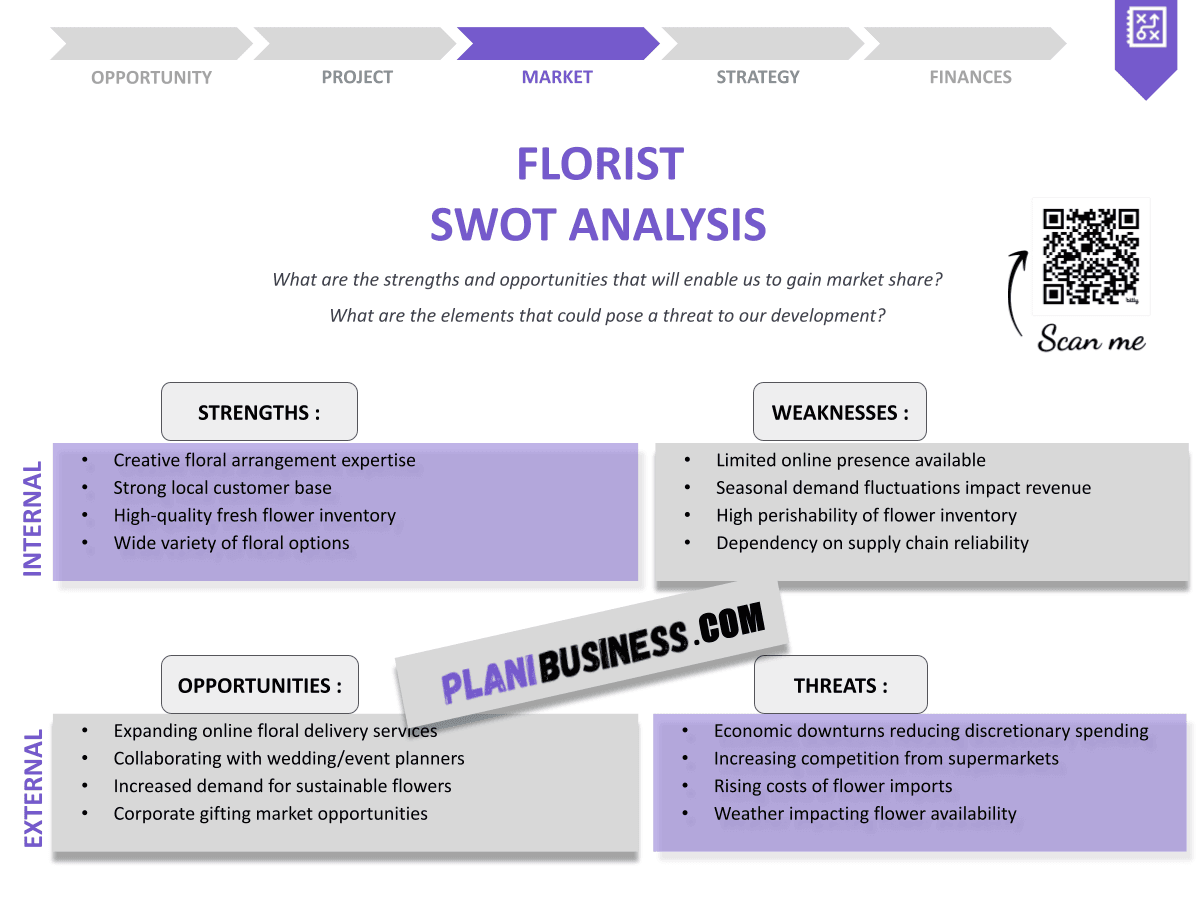Why Should You Have a SWOT Analysis for Your Florist Business?
Are you thinking about starting a florist business? You’re not alone! The floral industry is booming, and a well-crafted SWOT analysis can give you the edge you need to stand out. Did you know that over 80% of small businesses that conduct a SWOT analysis report better decision-making? A SWOT analysis is a strategic planning tool that helps you identify your business’s Strengths, Weaknesses, Opportunities, and Threats. It’s not just about knowing your market; it’s about understanding your position within it.
In the floral industry, having a clear view of your business landscape is essential. Whether you are a boutique florist or a mobile flower delivery service, understanding your internal capabilities and external market dynamics can make all the difference. This guide will help you navigate through the complexities of a SWOT analysis specifically tailored for florists.
- Importance of SWOT analysis for florists
- How to write a SWOT analysis
- Detailed examples of SWOT analyses
- Identifying strengths in your florist business
- Recognizing weaknesses to improve
- Exploring opportunities in the floral market
- Assessing threats from competitors
- Practical tips for conducting a SWOT analysis
- Real-life examples from successful florists
- Final thoughts and FAQs about SWOT analysis
How Do You Write a SWOT Analysis for Your Florist Business?
Writing a SWOT analysis for your florist business involves careful consideration of both internal and external factors. Start by gathering your team and brainstorming ideas. Here’s how to break it down:
Strengths
Your strengths might include unique floral arrangements, a loyal customer base, or a strong brand presence. Think about what sets your florist business apart from competitors. Are you known for exceptional customer service or sustainable sourcing? Document these attributes to leverage them effectively.
Weaknesses
Common weaknesses can be limited marketing efforts, high flower costs, or insufficient online presence. Acknowledge these areas honestly. Understanding your weaknesses is crucial for improvement and can help you create strategies to mitigate them.
Opportunities
Look for opportunities like seasonal events, partnerships with local businesses, or expanding your product range. The floral market is full of possibilities, especially if you tap into trends such as eco-friendly practices or online sales. Recognizing these opportunities can lead to growth and success.
Threats
Keep an eye on threats such as rising competition, economic downturns, or changes in consumer preferences. Being aware of these external factors allows you to prepare and adapt your strategies to stay competitive.
By following these steps, you can create a comprehensive SWOT analysis that will guide your florist business towards informed decisions and strategic growth.
SWOT Example N°1 for a Boutique Florist
In this example, we’ll analyze a boutique florist that specializes in custom arrangements. This type of florist business often focuses on unique designs and personalized customer experiences, which can set them apart in a competitive market.
| SWOT | Analysis |
|---|---|
| Strengths | Unique designs, high customer loyalty |
| Weaknesses | Higher price point, limited reach |
| Opportunities | Wedding market, corporate events |
| Threats | Big box retailers, online competition |
Summary List:
- Unique offerings
- Customer loyalty
- Niche market potential
- Competition from larger stores
- Boutique florists can capitalize on their unique designs to attract a specific clientele, but they must remain vigilant against price-sensitive competitors.
SWOT Example N°2 for a Seasonal Florist
This example focuses on a florist that primarily operates during holidays and special events. Seasonal florists often see spikes in demand during certain times of the year, such as Valentine’s Day and Mother’s Day.
| SWOT | Analysis |
|---|---|
| Strengths | Seasonal demand, strong marketing |
| Weaknesses | Limited year-round revenue |
| Opportunities | Expansion into year-round services |
| Threats | Economic fluctuations, changing trends |
Summary List:
- Seasonal spikes in sales
- Strong holiday marketing
- Potential for year-round growth
- Vulnerability to economic changes
- Seasonal florists need to diversify their offerings to avoid lean months and maintain steady cash flow.
SWOT Example N°3 for an Eco-Friendly Florist
Here, we’ll analyze a florist focused on sustainability and eco-friendly practices. This type of florist business appeals to environmentally conscious consumers and emphasizes the use of sustainable materials.
| SWOT | Analysis |
|---|---|
| Strengths | Eco-conscious branding, niche market |
| Weaknesses | Higher costs, limited supply |
| Opportunities | Growing demand for sustainable products |
| Threats | Price competition, supply chain issues |
Summary List:
- Eco-friendly branding
- Niche market appeal
- Increasing sustainability awareness
- Vulnerability to supply chain disruptions
- Eco-friendly florists can leverage their sustainable practices to attract environmentally conscious consumers, but they must manage costs effectively to remain competitive.
SWOT Example N°4 for a Mobile Florist
This example focuses on a mobile florist that offers delivery services. Mobile florists often cater to customers who prefer the convenience of having flowers delivered directly to their door.
| SWOT | Analysis |
|---|---|
| Strengths | Convenience, flexible scheduling |
| Weaknesses | Higher operational costs |
| Opportunities | Growing delivery trend |
| Threats | Competition from established businesses |
Summary List:
- Convenience factor
- Flexible service options
- Increasing demand for delivery
- Competition from traditional florists
- Mobile florists must ensure their delivery services are efficient to maintain customer satisfaction and loyalty.
SWOT Example N°5 for a Wedding Florist
In this analysis, we’ll look at a florist specializing in wedding arrangements. Wedding florists often create custom designs that cater to the unique preferences of couples, making them an essential part of the wedding planning process.
| SWOT | Analysis |
|---|---|
| Strengths | Specialized knowledge, strong networks |
| Weaknesses | Seasonal demand fluctuations |
| Opportunities | Partnering with wedding planners |
| Threats | Competition from other wedding vendors |
Summary List:
- Specialized expertise
- Strong vendor relationships
- Potential partnerships
- Seasonal fluctuations
- Wedding florists can thrive by building relationships with wedding planners and venues to secure more business and enhance their market presence.
SWOT Example N°6 for an Online Florist
This example examines a florist that operates primarily online. Online florists benefit from the convenience of e-commerce, allowing them to reach a wider audience without the constraints of a physical storefront.
| SWOT | Analysis |
|---|---|
| Strengths | 24/7 availability, wide reach |
| Weaknesses | Limited customer interaction |
| Opportunities | Expanding into new markets |
| Threats | High competition in the online space |
Summary List:
- Convenience of online shopping
- Wide geographic reach
- Potential for growth
- High competition levels
- Online florists need to invest in marketing strategies to stand out in a crowded marketplace and enhance their visibility.
SWOT Example N°7 for a Community Florist
This example looks at a florist that focuses on community engagement. Community florists often participate in local events and collaborate with other businesses to build strong relationships within their neighborhoods.
| SWOT | Analysis |
|---|---|
| Strengths | Community ties, local sourcing |
| Weaknesses | Limited marketing budget |
| Opportunities | Community events and partnerships |
| Threats | Larger corporate florists |
Summary List:
- Strong local ties
- Support from the community
- Potential for local collaborations
- Threat from larger chains
- Community florists should leverage their local connections to foster loyalty and support, creating a unique place in the market.
SWOT Example N°8 for a High-End Florist
This example features a florist that caters to high-end clients. High-end florists typically focus on premium products and exclusive services, appealing to a more affluent customer base.
| SWOT | Analysis |
|---|---|
| Strengths | Premium products, exclusive clientele |
| Weaknesses | High overhead costs |
| Opportunities | Corporate contracts, luxury events |
| Threats | Economic downturns affecting luxury spending |
Summary List:
- Premium offerings
- Exclusive clientele
- Opportunities in corporate gifting
- Economic sensitivity
- High-end florists must maintain quality and exclusivity to justify their pricing and ensure customer satisfaction.
SWOT Example N°9 for a Subscription Florist
This example highlights a florist offering subscription services. Subscription florists provide regular deliveries of fresh flowers to customers, creating a steady income stream and fostering customer loyalty.
| SWOT | Analysis |
|---|---|
| Strengths | Recurring revenue, customer loyalty |
| Weaknesses | Dependence on subscription base |
| Opportunities | Expanding subscription options |
| Threats | Market saturation |
Summary List:
- Steady income
- Customer retention
- Potential for growth
- Competitive market
- Subscription florists can enhance customer experience by offering customizable options and flexible delivery schedules to attract a broader audience.
SWOT Example N°10 for a Florist with Workshops
In this final example, we’ll look at a florist that offers workshops. Florists conducting workshops provide hands-on experiences for customers, teaching them about flower arrangements and floral design.
| SWOT | Analysis |
|---|---|
| Strengths | Hands-on experience, community engagement |
| Weaknesses | Time-consuming, resource-intensive |
| Opportunities | Increased brand awareness, additional revenue |
| Threats | Competition from other workshops |
Summary List:
- Engaging community
- Brand building
- Additional revenue streams
- Competition for workshops
- Florists offering workshops can build community ties and enhance brand loyalty while providing unique experiences that differentiate them from competitors.
Conclusion
In conclusion, a SWOT analysis is a powerful tool that can help florists understand their business landscape better. By assessing your strengths, weaknesses, opportunities, and threats, you can make informed decisions that drive your florist business toward success. Don’t forget to utilize the insights gained from these examples to create your unique SWOT analysis!
If you’re looking for a solid foundation for your business, consider checking out this business plan template for florists. It can help you organize your thoughts and strategies effectively. Also, if you’re just starting out, be sure to read our article on How To Start a Florist? to get valuable insights. Finally, don’t miss our guide on How To Write a Florist Marketing Plan? to enhance your marketing strategies.
FAQ
1. What is a SWOT analysis?
A SWOT analysis is a strategic planning tool that helps businesses identify their Strengths, Weaknesses, Opportunities, and Threats in the market.
2. Why is a SWOT analysis important for florists?
It allows florists to gain insights into their market position and make strategic decisions to improve their business.
3. How often should I conduct a SWOT analysis?
It’s advisable to review your SWOT analysis annually or whenever significant changes occur in your florist business.
4. Can a SWOT analysis help with marketing strategies?
Yes! Understanding your strengths and opportunities can help you create effective marketing strategies tailored to your target audience.
5. What are some common weaknesses for florists?
Common weaknesses include limited marketing efforts, high costs of flowers, and a lack of online presence.
6. How can I identify opportunities for my florist business?
Look for trends in the floral industry, customer feedback, and potential partnerships to identify new opportunities.
7. What threats should florists be aware of?
Florists should be aware of threats such as increased competition, economic downturns, and shifting consumer preferences.
8. Is it better to focus on strengths or weaknesses in a SWOT analysis?
Both aspects are crucial! Strengths help you leverage what you do well, while weaknesses highlight areas that need improvement.
9. How can I use a SWOT analysis to improve my florist business?
Utilize it to develop strategies that capitalize on your strengths and opportunities, while addressing weaknesses and mitigating threats.
10. Are there examples of successful florists using SWOT analysis?
Indeed, many successful florists use SWOT analysis to guide their business strategies and enhance their competitive advantage.







